I recently became to wonder- how are hardware standards such as the USB,SD card,PCI-E made and what would it take to make my own?
-
8Part 1: 0.5mm HB mechanical pencil. Part 2: coffee or cannabis (depending how good you are at systems engineering). Part 3: mallet to keep stakeholders in their place. [Sorry, I couldn't resist.] – Nick Alexeev Jul 01 '13 at 14:54
-
There is so much involved, you probably don't wanna know ;) – Rev Jul 01 '13 at 14:54
-
10Anyone can define a standard. Getting other people to follow it is the tricky part. – Olin Lathrop Jul 01 '13 at 15:17
-
1Generally, conventions designed by individuals are unlikely to become standards unless they perform some task for which demand is high but no common implementations exist. It's generally not useful to try to create an industry-wide standard for things. On the other hand, development of in-house standards can be useful, and there are some important things one should do to maximize their usefulness. If you're interested in how to develop effective in-house standards for something, you should clarify your question. – supercat Jul 01 '13 at 16:30
-
And what happens to "standards" that fail to gain (as much) acceptance? They're history. HD-DVD, Betamax, [Mini USB](http://electronics.stackexchange.com/q/18552/2028)... – JYelton Jul 01 '13 at 18:15
1 Answers
Anyone can make a standard. Here's one I just made up:
Connections are made by pins compatible with Lego bricks. A binary "1" is signaled by alternating between 10 mA and 5 mA at intervals of 1 s, while a binary "0" is signaled by a 100 kV pulse.
If you want your standard to be adopted, you need to persuade a lot of other people to use it. Usually this is done by major manufacturers, who decide to work with other major manufacturers to make their products interoperable, with the goal of making their products more appealing to consumers, or at least controlling the market, driving competitors out of business, thus making their products relatively more appealing.
There are various standards organizations that facilitate this process: ANSI, IEEE, ISO, IETF, W3C...the list goes on. Each has some authority in differing domains, some compete, some work for profit, some are non-profit. Some require membership while others are open. Some publish their standards publicly, some require membership to view.
- 56,804
- 17
- 141
- 262
-
1Is there enough clearance and creepage between the Lego brick pins for 100kV? We must harmonize this new standard with IEC and UL. – Nick Alexeev Jul 01 '13 at 15:02
-
